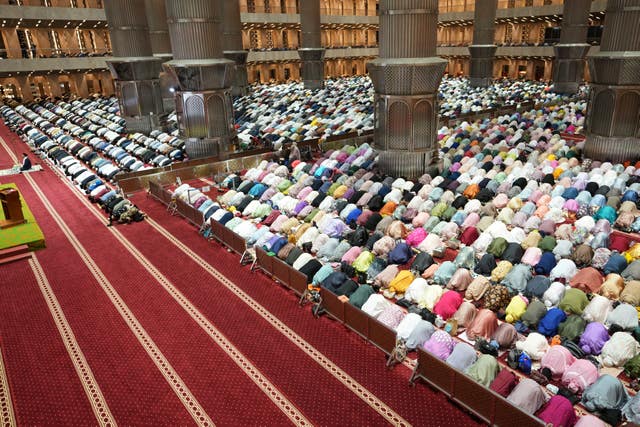
Islamic authorities in Indonesia have said the first day of Ramadan will begin on Thursday, as millions of faithful in the world’s most-populous Muslim-majority country began marking the holy month with fasting and prayers.
Religious affairs minister Yaqut Cholil Qoumas declared that Islamic astronomy observers teams from several of the country’s regions had sighted the crescent moon, the official start of Ramadan. Shortly after, worshippers flooded mosques to offer prayers.
Muslim authorities in Saudi Arabia and several other Middle Eastern countries said earlier that Ramadan in their region would begin on Thursday based on the expected sighting of the crescent moon.
Clerics across the Middle East said the moon was not visible on Tuesday night, meaning it would almost certainly appear the following evening.

During Ramadan, Muslims refrain from eating, drinking, smoking, and sexual intercourse from sunrise until sunset. Even a tiny sip of water or a puff of smoke is enough to invalidate the fast. At night, family and friends gather and feast in a festive atmosphere.
The fasting is aimed at bringing the faithful closer to God and reminding them of the suffering of the poor. Muslims are expected to strictly observe daily prayers and engage in heightened religious contemplation. They are also urged to refrain from gossip, fighting or cursing during the holy month.
Fasting is one of the five pillars of Islam and is required for all healthy Muslims. But there are exemptions for those who are ill, and for women who are pregnant or breastfeeding. Small children are not expected to fast.
Islam follows a lunar calendar, so Ramadan begins around a week-and-a-half earlier each year. At the end of Ramadan, Muslims celebrate the Eid al-Fitr holiday, when children often receive new clothes and gifts.


Comments: Our rules
We want our comments to be a lively and valuable part of our community - a place where readers can debate and engage with the most important local issues. The ability to comment on our stories is a privilege, not a right, however, and that privilege may be withdrawn if it is abused or misused.
Please report any comments that break our rules.
Read the rules here